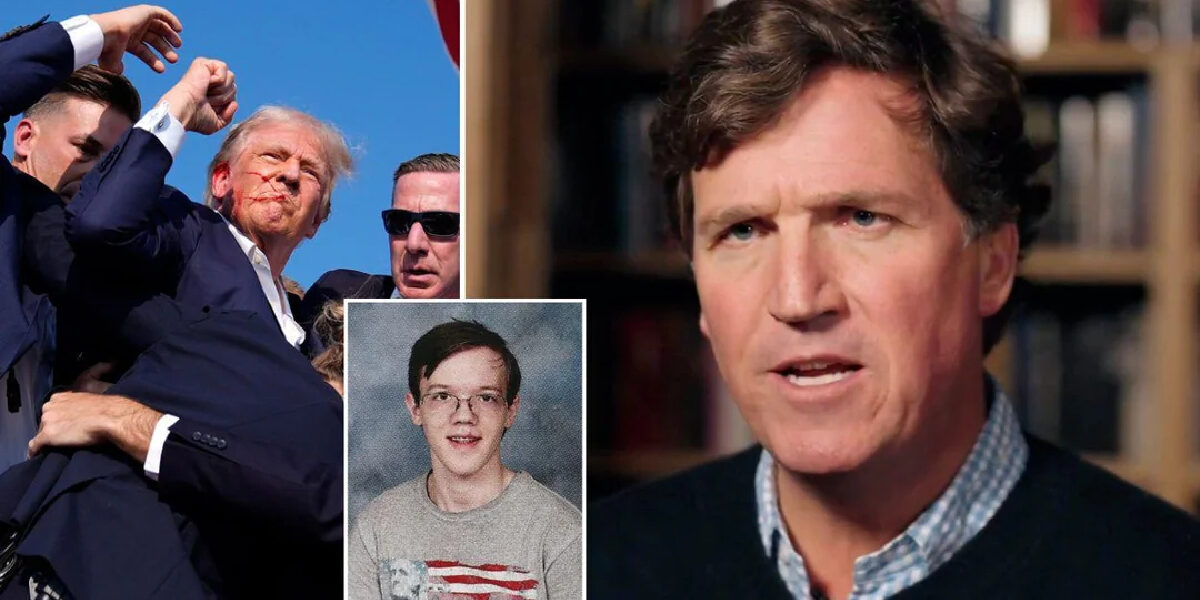Tucker Carlson is now openly accusing the FBI — including the leadership appointed during Donald Trump’s current term — of hiding critical details about the attempted assassination in Butler, Pennsylvania. In a new video, Carlson suggests that the bureau, led by Trump’s own newly installed team under Kash Patel and Dan Bongino, is withholding the truth about what happened the day 20-year-old Thomas Crooks nearly killed a former president.
The core of Carlson’s argument is explosive: he isn’t just challenging federal agencies — he’s accusing Trump’s own security allies of reinforcing a misleading narrative.
Hours before Carlson released his video, the FBI issued a statement insisting there was “no evidence of advance warnings” and urging the public to avoid “speculation.” Carlson interprets that as a preemptive attempt to discredit him before he presented his evidence.
Reframing Who Thomas Crooks Really Was
Before Carlson even addresses the Butler timeline, he focuses heavily on Crooks himself. Contrary to early reporting that described Crooks as politically vague or unaffiliated, Carlson argues that Crooks’ digital history tells a very different story.
Based on archived posts and online comments, Carlson claims:
- Crooks frequently praised fringe-right personalities
- He posted about “Deep State traitors”
- He described Donald Trump as “the only one fighting for us”
Carlson argues these details undermine the media narrative that Crooks’ motives were “unclear.” But he also notes that Crooks, for reasons still unknown, appears to have turned against Trump shortly before the attack.
To Carlson, Crooks’ online footprint reflects a young man consumed by right-wing conspiratorial content — not a leftist radical. And he believes the FBI’s rapid downplaying of Crooks’ motive makes the situation even more suspicious.
Missed Warnings and Witness Accounts
Carlson’s argument builds around several key points:
1. Rallygoers Reported Crooks Before the Shooting
Multiple attendees reported seeing a suspicious man on a rooftop carrying a backpack and what appeared to be a rangefinder. According to Carlson, these warnings were relayed to law enforcement before Trump took the stage — yet no action was taken.
He argues that the security response wasn’t just inadequate, but that officials immediately began obscuring how badly they failed.
2. Changing FBI Statements
Initial FBI comments suggested Crooks wasn’t politically motivated. Later statements acknowledged computer searches for both Trump and Biden.
Carlson claims these shifting narratives suggest the bureau is constructing a story rather than telling the truth.
3. A Flawed Timeline
Carlson alleges the official FBI timeline does not include witness accounts from before the shooting. He asks why those reports were omitted — implying intentional suppression rather than oversight.
Turning the Accusation Toward Trump’s Own Team
What makes Carlson’s video especially notable is who he targets.
He directly challenges:
- FBI Director Christopher Wray
- Kash Patel
- Dan Bongino
All three have defended how the Secret Service and FBI handled the incident. Patel has said agencies followed “proper protocol,” while Bongino argued the rooftop may not have been seen as a “legitimate threat” at the time.
Carlson suggests their defenses serve to protect the official narrative — and that the FBI benefits from having Trump-aligned figures validate its story. This creates an unusual dynamic: Carlson is accusing Trump’s own security leadership of helping cover up failures that nearly cost Trump his life.
It’s a rare moment in which Carlson turns his distrust inward toward a Republican administration.
Carlson’s Final Five Questions
Carlson ends his video with five pointed questions designed to cast doubt on the official account:
- Why were rooftop warnings ignored?
- Why are witness accounts missing from the FBI timeline?
- Were local law-enforcement concerns overridden — and by whom?
- If the FBI is confident in its narrative, why does it keep shifting?
- And the biggest question: Who benefited from the security failure that nearly killed a former president?
The questions serve as accusations masked as inquiry — a classic Carlson technique.
The Larger Implication: No Administration Is Trustworthy
Carlson’s argument ultimately goes beyond partisan criticism. He suggests the security and intelligence failures surrounding the Butler attack point to systemic rot that existed in both the Trump and Biden eras. For his audience, the takeaway is clear: the government cannot be trusted, regardless of who is in power.
Whether this is ideological conviction or a rhetorical strategy is debatable. But Carlson’s message is unmistakable:
According to him, the Butler incident wasn’t just a failure — it was a failure the government is actively trying to hide.
